In the last and final chapter, Mitali takes an overview of being in China and India. She aspires to transcend all man-made boundaries to be in a unified, borderless world. An exclusive for Different Truths.
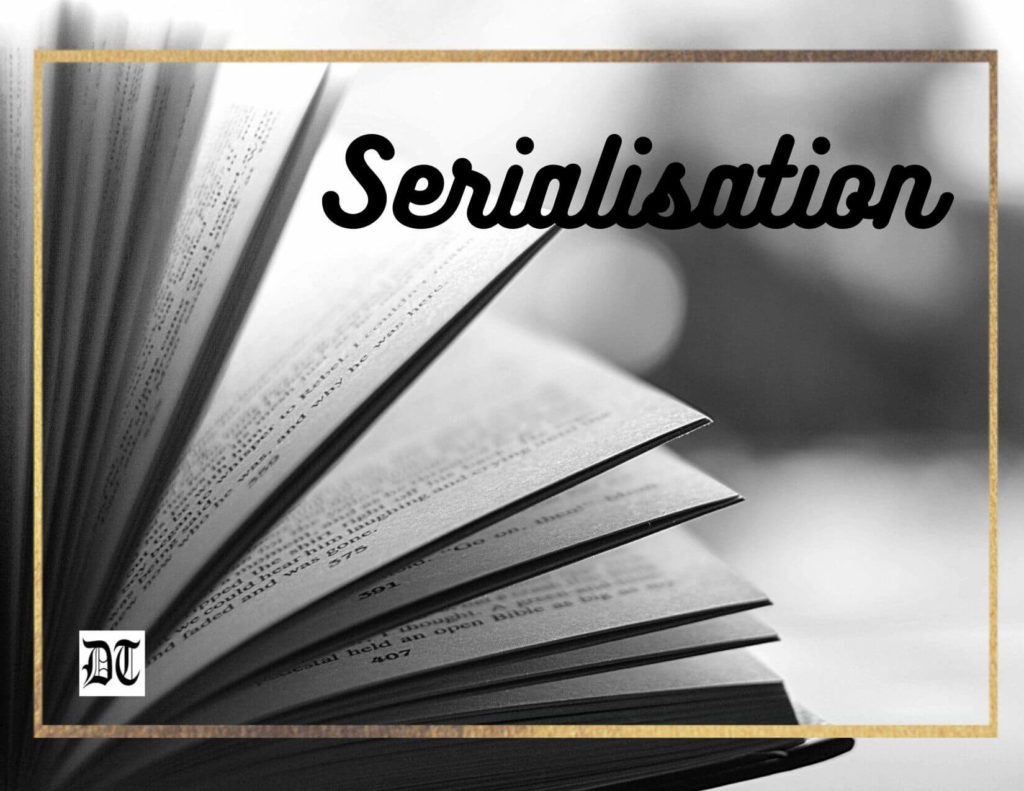
Think of the sky. Think big. Think of the universe
The sky stretches out like an awning unifying, protecting, and nurturing all mankind living under it. The biggest wonder of this universe, the Earth, is the home to all humankind. How fortunate are we to be a part of this wonder, to see a wave crash against a cliff and break into zillions of sparkling drops, each reflecting a miniature rainbow as it glistens in the sunshine! The rainbows in the droplets are like humans of various skin colours, castes and creeds. Humans are tinier in context of the universe than the little rainbows reflected in the water droplets. This vastness of the universe weaves a sense of wonder, to explain which men through the annals of history have resorted to diverse myths and ways of life.
The Earth is unique and special because it is home to our kind and its ambience has till now effortlessly supported our species.
The Earth is unique and special because it is home to our kind and its ambience has till now effortlessly supported our species. We are all connected under a united sky on land which earlier had only geographical barriers or borders. Borders have always been a transient phenomenon, changing with tectonic movements, altering climates and more recently, with man made constructs, like nationalism, faith, caste and creed.
Our sojourn in China just strengthened the belief that mankind is of one species and the borders that have been drawn are all mobile and erasable. They change with the passage of history and time. When countries go to war over these artificial borders, it is the common people who suffer. Soldiers on both sides are like you and me. We need to keep reminding ourselves castes, creeds, faiths are all man made as are borders drawn between different nations. And whether a human is a Chinese or an American, they all need love and care as much as an Indian.
We have so many stories glorifying differences and heroes who have killed to become great. I can never understand that logic.
We have so many stories glorifying differences and heroes who have killed to become great. I can never understand that logic. Especially, because these differences only brew hate and anger. The China-India border impasse has become a ritual1 synonymous with failure to resolve differences amicably. However, when we have our brothers and sons posted at the border or fall victim to a bombing — even anywhere else in the world, we all emote. We feel sad for lost lives. We feel helpless and start hating. Wars are fought by commoners like us to settle differences between persons who do not fight in the frontlines themselves.
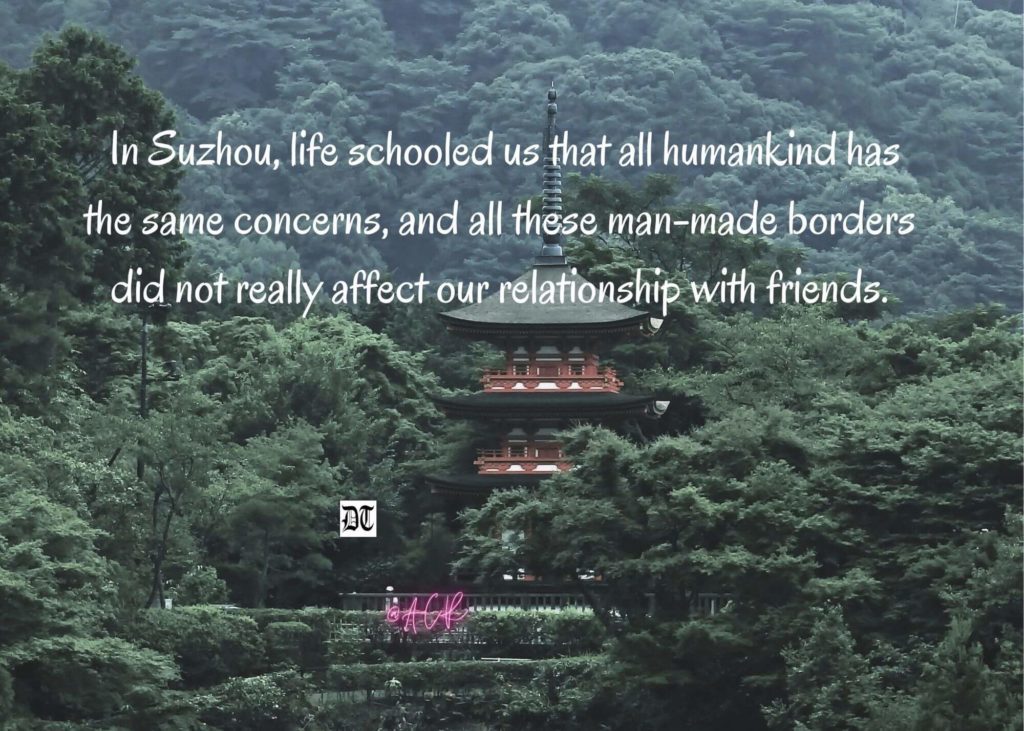
In Suzhou, life schooled us that all humankind has the same concerns, and all these man-made borders did not really affect our relationship with friends. I remember hearing from Aditya that his friend Salim, while on a camping trip where they were leading a bunch of younger schoolmates, sang the Pakistani and Indian national anthems at one go — though the scales left much to be desired. This rendition I believe was to add to the team spirit of students from a variety of nationalities. In China, we were part of a miniature world where each respected the other’s creed and beliefs. We celebrated Diwali with families from Finland, China, Pakistan and Poland — none of them Hindus, but Muslims, Christians and free thinkers. Our only major fear was the boys should not be hurt by the fireworks!
In today’s day and age when fireworks have become synonymous with the taboo of enhancing pollution, it is not the best to disclose that Aditya and Salim wanted to make firecrackers in the garage.
In today’s day and age when fireworks have become synonymous with the taboo of enhancing pollution, it is not the best to disclose that Aditya and Salim wanted to make firecrackers in the garage. We turned down their offer to save costs for the fear of explosions, which the boys had already wrought while doing a chemistry experiment in school. I got to hear of it at the parent teacher meeting from an indulgent teacher who asked me if Aditya had informed me of the blast. Aditya said it was merely a ‘pop-test’. The Chinese fireworks were better than a pop-test! They lit up the sky and filled it with unimaginable colours and patterns for a few seconds. Our driver offered to help. He had earlier helped us locate the fireworks’ stores. He was as delighted as the children. Only the mothers were wary of accidents as the boys tumbled over each other in a bid to light the sky with the magic that we see at the start of each Disney movie – fireworks. Only this was in the real world, in the open skies of China, and not in Disneyland shows2 where fireworks were a regular feature, as they were on the Fourth of July celebrations in the USA and the New Year Eve celebrations in Suzhou.
One evening in the year and a solitary event — can it lead to heightening pollution levels if all of us keep within the limits of a few crackers to have fun and not showcase how much money we are willing to burn? Also, how much does mass over production by huge conglomerates and agricultural practices contribute to the pollution index? China would close down companies3 in winter if they exceeded their quota of energy consumption and emissions.
Back in our little utopian bubble in Suzhou, we celebrated Id with sumptuous kebabs and Christmas with Christmas trees, carols and parties.
Back in our little utopian bubble in Suzhou, we celebrated Id with sumptuous kebabs and Christmas with Christmas trees, carols and parties. It was truly a syncretic world in a microcosm.
Leaving China, I have wondered why could it not have continued to be so in a macrocosm? Why do we fight? And over what? The ‘isms’ have clearly created schisms in the human heart that at this point seem to violate all attempts to breach or heal the wounds. But, if we can heal a hole in the ozone layer of the atmosphere4 and look forward to a prolonged existence on our home planet, can we not heal breaches borne of ideas that grew out of the need to earn a living and sell merchandise?
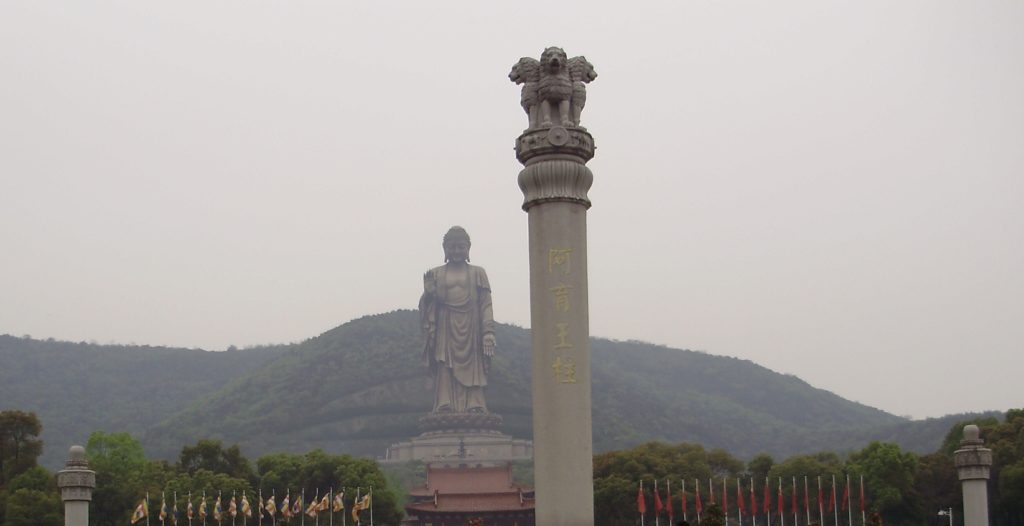
I recall the Indian lore that we saw in China, not just in the temples of Luoyang and Suzhou, but also in the Ashok Stupa5 that resides in Wuxi. The mingling of the two neighbours’ cultures and customs stretched beyond artificial borders to matters of faith and acceptance at a point in history. Yet, when did the tables turn? Why is it we no longer like our neighbours when every Indian, Chinese or any human belonging to a nation is not a vindictive politician trying to win rule by mutating laws to serve their self-interest or by exploiting the policy of Divide and Rule6? The old colonial weapon split the Indian subcontinent, Malaya7, Korea8(where Koreans had no say, the decision being made by USA and USSR for them) and more countries. The common people often did not have a say in the calls made by the rulers of the country – think of all the historic quelling of expression that have been practiced by many power brokers9. Then why are we picking on the politics of the rulers to judge the commoners – our own neighbours?
After spending the first two decades of my life in India and eight years in China, I would still say I know very less of these countries and their cultures. They are too big and diverse for me to grasp in a single lifetime. I always believed that being Indian was synonymous to accepting diversities and the different shades of grey. But recent events have only highlighted how intolerance has wreaked havoc among differences which in my childhood were accepted as a part of our regular life.
Can we not transcend borders in our quest for peace and move forward to a better tomorrow, conquer the pandemic and the hate?
In that vein, I could tell you stories of how many belonging to different nationalities, including those who belong to the country I was born to, have misbehaved. But I would be narrow and biased if I let the misbehaviour of a few affect my judgement of a whole region, of a vast humanity who would like to be kind, love and be loved. Can we not transcend borders in our quest for peace and move forward to a better tomorrow, conquer the pandemic and the hate? After all, the buildings wrecked by the Red Guards of Mao have been rebuilt. Destroying monuments is perhaps not the best way to wipe away what centuries of beliefs have rubbed into our blood and bones. Won’t it be better to dispense our energy on healing the present rather than on avenging the past?
Shakespeare had it right when he depicted that Lady Macbeth could never, even in her madness10, wipe the blood off her hand after she goaded Macbeth to kill the king.
When we boarded the flight to Singapore with two suitcases and a bag three decades ago, we had planned to return home in two years. Then our definition of home changed. The two years have stretched to thirty, and now, even when we travel for two weeks with the family, which has doubled its numbers, we need four suitcases, four backpacks, and cabin luggage. We can never return to the times we left behind. We have changed as has the world. We are richer for all the experiences we have had over the years. My children gained in friends from all over the world and in varied experiences. These experiences most of all helped concretise a dream of a utopia – a borderless world.
Perhaps, the borderless world we experienced was just part of a bubble that formed at a point in China. And perhaps that bubble did burst… but can we recreate another one big enough to envelope the whole world and have it shower all mankind with a sense of camaraderie, goodwill, love, and tolerance?
This is a choice you need to make as much as me. We could do that together under a borderless sky that stretches with goodwill over the whole Earth, the home of our species…
References
2 https://disneyland.disney.go.com/entertainment/disneyland/fireworks/ & https://www.youtube.com/watch?v=sRh9krE4PtA
3 https://www.youtube.com/watch?v=sRh9krE4PtA
4 https://www.britannica.com/story/is-the-ozone-layer-finally-healing-itself
5https://www.reddit.com/r/travel/comments/7x64an/lingshan_buddha_in_wuxi_china_you_can_find_ashoka/
6 https://www.aljazeera.com/opinions/2017/8/10/the-partition-the-british-game-of-divide-and-rule
7 https://www.britannica.com/place/Malaysia/The-impact-of-British-rule
8 https://www.history.com/news/north-south-korea-divided-reasons-facts
9 https://www.history.com/topics/china/tiananmen-square &
10 https://myshakespeare.com/macbeth/act-5-scene-1
(Concluded)
Photo sourced by the author and visuals by Different Truths

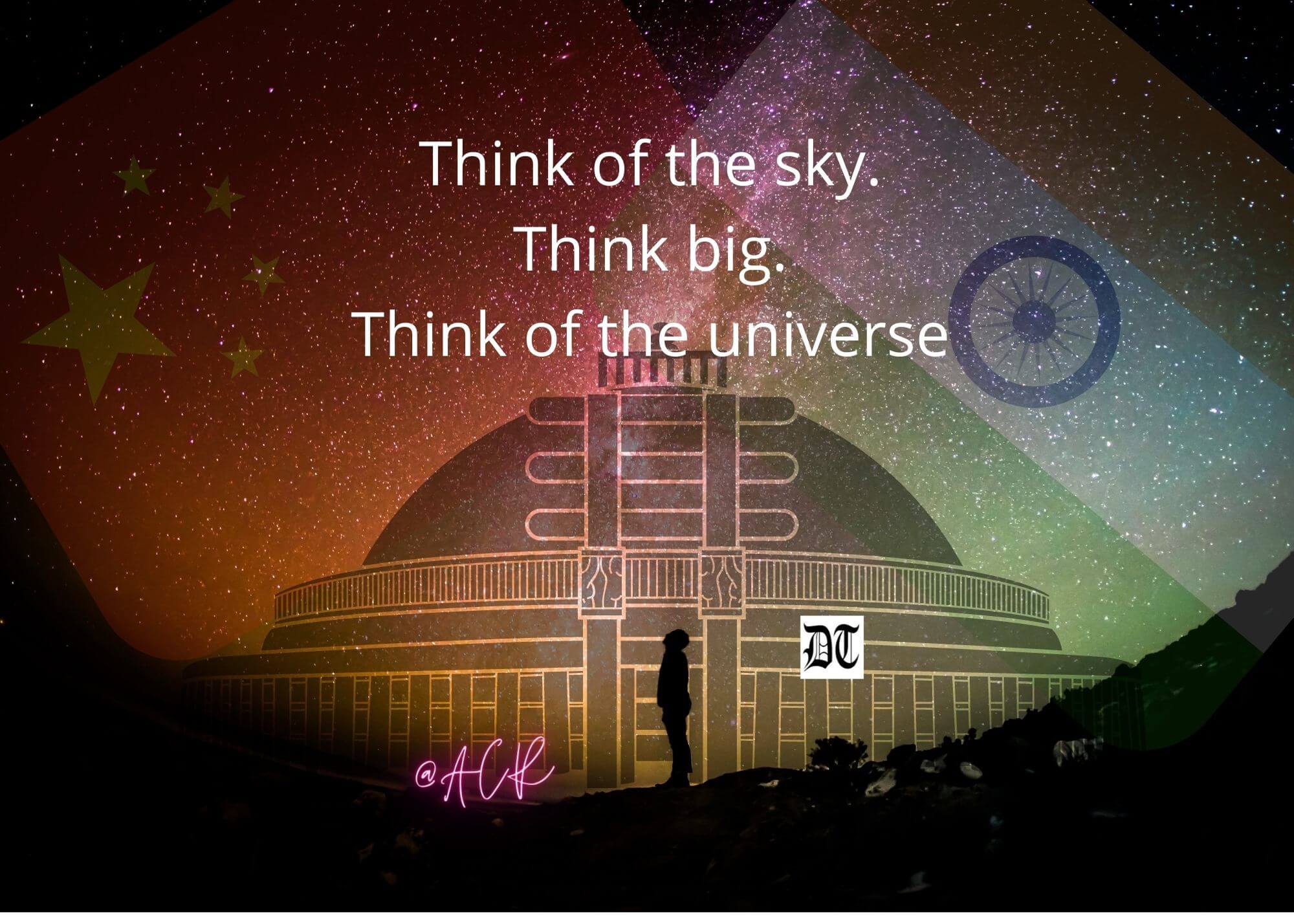
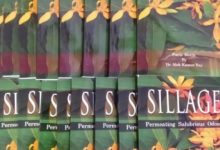
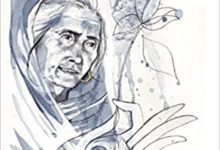

 By
By
 By
By

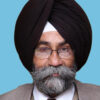 By
By